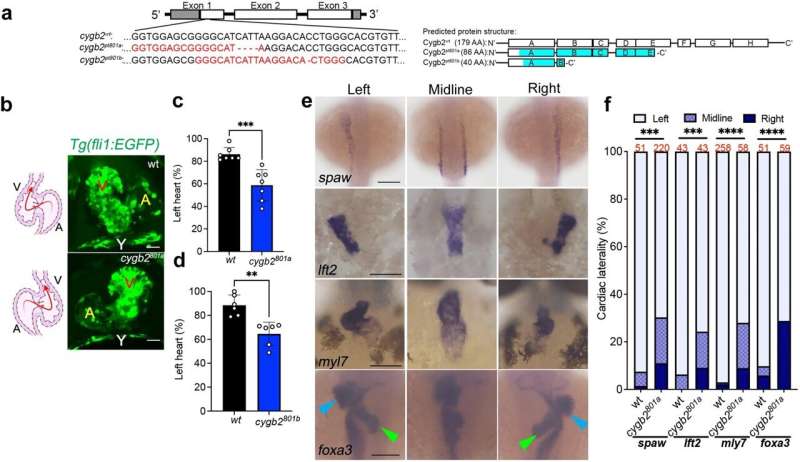
In a research study led by the University of Maryland School of Medication, scientists found for the very first time that a specific sort of protein comparable to hemoglobin, called cytoglobin, plays an essential function in the advancement of the heart. Particularly, it impacts the right left-right pattern of the heart and other uneven organs.
The findings, released today in the journal Nature Communications, might ultimately result in the advancement of brand-new healing interventions to change the procedures that result in these flaws.
The group utilized CRISPR gene modifying innovations to knock out the cytoglobin gene in zebrafish. The absence of cytoglobin triggered the advancement of embryos with a mirrored heart, suggesting the heart had a reversed left-right pattern. In human beings, cytoglobin is associated with nitric oxide procedures, a substance that assists manage healthy blood circulation to organs.
Research study co-senior author Mark T. Gladwin, MD, the John Z. and Akiko K. Bowers Distinguished Teacher and Dean, University of Maryland School of Medication, and Vice President for Medical Affairs, University of Maryland, Baltimore, has actually been investigating the impacts of nitric oxide on capillary for more than twenty years consisting of in this current research study finding.
” Considering that its discovery 20 years earlier, cytoglobin has actually been discovered to be revealed in almost all human tissues, however the systems of how this protein functions were mostly unidentified,” stated Dr. Gladwin. “We understand that cytoglobin can contribute in regulating and preserving nitric oxide levels, however our brand-new finding shows that it favorably controls NO production to guarantee appropriate cilia function, and its lack can result in significant laterality problems of organs.”
To carry out the research study, the research study group knocked out the gene for cytoglobin in zebrafish and was impressed to see that it caused remarkable flaws in the structure and place of organs in establishing embryos. The heart, for instance, was found on the ideal side of the fish rather of the left, with a looping to the left rather of the right.
” We discovered that cytoglobin plays a crucial function in the structure and function of small hair-like structures called cilia, which identify the asymmetry and appropriate advancement of organs,” stated research study senior author Paola Corti, Ph.D., Assistant Teacher of Biochemistry and Molecular Biology at UMSOM.
This is the very first time cytoglobin– or any of the globin proteins like hemoglobin– has actually been discovered to be associated with fetal advancement which a scarceness might be connected to abnormality. It’s likewise the very first time that cytoglobin has actually been connected to cilia function. Such a finding might unlock for the advancement of rehabs for unusual abnormality that impact the motion of cilia.
About 1 in every 10,000 to 30,000 individuals are born with Main Ciliary Dykinesia (PCD), an unusual illness that impacts the cilia and can trigger breathing problems from thickened mucous blocking respiratory tracts. “Kartagener’s syndrome is a kind of PCD and is understood to trigger the kind of heart flaws seen in the zebrafish where the heart is unusually placed to the right and turned,” stated Dr. Corti. “There is no remedy for this condition, simply surgical treatment to repair any heart flaws and treatments to handle signs.”
While specific genes have actually been recognized that are understood to trigger about 70 percent of PCD cases, cytoglobin might play an essential function in the 30 percent of cases without any recognized hereditary cause.
” We discovered the phenotype and linked the dots to cilia. In the existence of cytoglobin, we might track the function of the protein and how it caused appropriate cilia function and organ advancement. In the lack, we saw these flaws,” stated Elizabeth Rochon, Ph.D., very first author of the research study and Assistant Teacher of Medication at UMSOM.
More info:
Elizabeth R. Rochon et al, Cytoglobin controls NO-dependent cilia motility and organ laterality throughout advancement, Nature Communications (2023 ). DOI: 10.1038/ s41467-023-43544-0
Citation:.
Scientists find first-ever link in between hemoglobin-like protein and typical heart advancement (2023, December 15).
obtained 15 December 2023.
from https://medicalxpress.com/news/2023-12-first-ever-link-hemoglobin-like-protein-heart.html.
This file undergoes copyright. Apart from any reasonable dealing for the function of personal research study or research study, no.
part might be recreated without the composed consent. The material is offered info functions just.